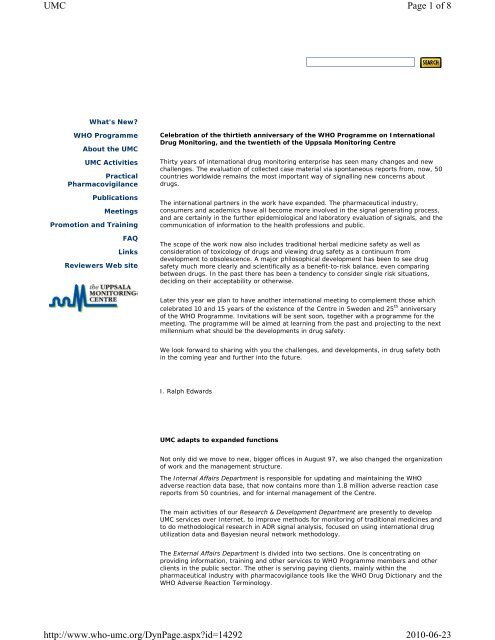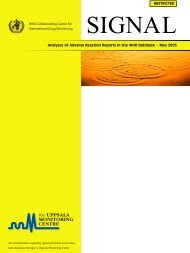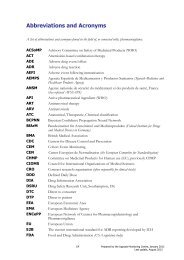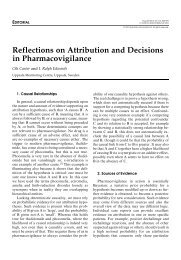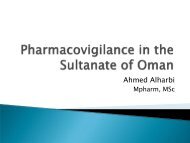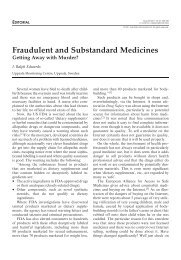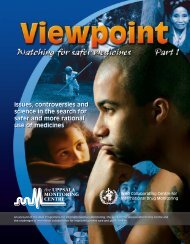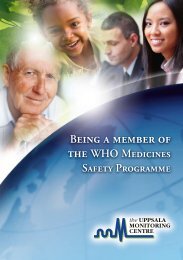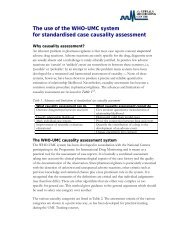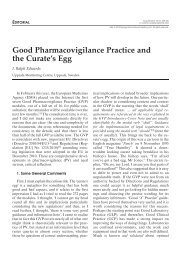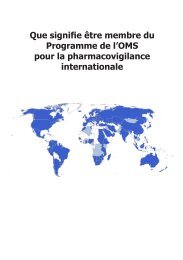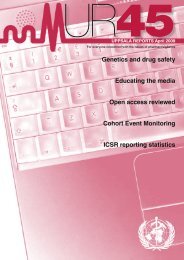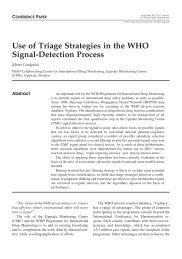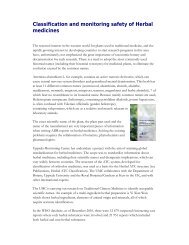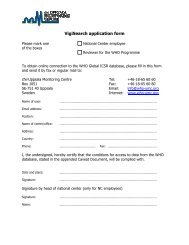March 1998 - Uppsala Monitoring Centre
March 1998 - Uppsala Monitoring Centre
March 1998 - Uppsala Monitoring Centre
Create successful ePaper yourself
Turn your PDF publications into a flip-book with our unique Google optimized e-Paper software.
UMChttp://www.who-umc.org/DynPage.aspx?id=14292Page 1 of 82010-06-23What's New?WHO ProgrammeAbout the UMCUMC ActivitiesPracticalPharmacovigilancePublicationsMeetingsPromotion and TrainingFAQLinksReviewers Web siteCelebration of the thirtieth anniversary of the WHO Programme on InternationalDrug <strong>Monitoring</strong>, and the twentieth of the <strong>Uppsala</strong> <strong>Monitoring</strong> <strong>Centre</strong>Thirty years of international drug monitoring enterprise has seen many changes and newchallenges. The evaluation of collected case material via spontaneous reports from, now, 50countries worldwide remains the most important way of signalling new concerns aboutdrugs.The international partners in the work have expanded. The pharmaceutical industry,consumers and academics have all become more involved in the signal generating process,and are certainly in the further epidemiological and laboratory evaluation of signals, and thecommunication of information to the health professions and public.The scope of the work now also includes traditional herbal medicine safety as well asconsideration of toxicology of drugs and viewing drug safety as a continuum fromdevelopment to obsolescence. A major philosophical development has been to see drugsafety much more clearly and scientifically as a benefit-to-risk balance, even comparingbetween drugs. In the past there has been a tendency to consider single risk situations,deciding on their acceptability or otherwise.Later this year we plan to have another international meeting to complement those whichcelebrated 10 and 15 years of the existence of the <strong>Centre</strong> in Sweden and 25 th anniversaryof the WHO Programme. Invitations will be sent soon, together with a programme for themeeting. The programme will be aimed at learning from the past and projecting to the nextmillennium what should be the developments in drug safety.We look forward to sharing with you the challenges, and developments, in drug safety bothin the coming year and further into the future.I. Ralph EdwardsUMC adapts to expanded functionsNot only did we move to new, bigger offices in August 97, we also changed the organizationof work and the management structure.The Internal Affairs Department is responsible for updating and maintaining the WHOadverse reaction data base, that now contains more than 1.8 million adverse reaction casereports from 50 countries, and for internal management of the <strong>Centre</strong>.The main activities of our Research & Development Department are presently to developUMC services over Internet, to improve methods for monitoring of traditional medicines andto do methodological research in ADR signal analysis, focused on using international drugutilization data and Bayesian neural network methodology.The External Affairs Department is divided into two sections. One is concentrating onproviding information, training and other services to WHO Programme members and otherclients in the public sector. The other is serving paying clients, mainly within thepharmaceutical industry with pharmacovigilance tools like the WHO Drug Dictionary and theWHO Adverse Reaction Terminology.
UMChttp://www.who-umc.org/DynPage.aspx?id=14292Page 2 of 82010-06-23In early <strong>1998</strong> two new persons were employed. Ms Inger Forssell is our new sales assistantwho will also take care of accounting for the <strong>Centre</strong>. Ms Erica Wallette, replacing MonicaPettersson during her extended maternity leave, will mainly be working with processing ofincoming adverse reaction reports.News from around the worldAustraliaThe former head of the national pharmacovigilance centre in Australia, Dr Alain Rohan, hasnow become director of pharmacovigilance at the company 3M in Saint Paul, Minesota,USA. He may be contacted by fax (+1-612-7336068) or e-mail (arohan1@mmm.com)European UnionAt the office of the Commission of the European Union, Directorate General III, in BrusselsDr Ana de Vasconcelos Batalha now has the responsibility for pharmacovigilance issues, inthis function succeeding Mr Philippe Meyer, who has moved to DG I. Dr Batalha paid a veryshort visit to our centre in November 97.New ZealandThe <strong>Centre</strong> for Adverse Reactions <strong>Monitoring</strong> (CARM) has got a new head after Dr PeterPillans, who late 1997 took up a position as Professor of Clinical Pharmacology at PrincessAlexandra Hospital, Brisbane, Australia. He is replaced by Dr David Coulter, since long headof the Intensive Medicines <strong>Monitoring</strong> Programme.South AfricaDr Ushma Mehta supervised a pharmacovigilance training course held in Cape Town on 29November. There were 14 participants including representatives from Ethiopia, Sudan,Scotland, Moczambique, Ghana and South Africa. The principles of problem-based teachingwere used. Questions like when to report, who should report, confidentiality and the specialconcerns of African countries, created a lot of discussion during this short course that mightbe repeated next year.SudanCommissioned by the WHO Regional Office for the Eastern Mediterranean, Dr RonnieMeyboom of the Netherlands spent the two first weeks of <strong>1998</strong> in Sudan, lecturing aboutpharmacovigilance and how to set up a national centre. His report will contain a plan onhow such a centre may be established in the country.TanzaniaMs Rose Shija, the former head of the Tanzania Drug and Toxicology Information Service(TADATIS) in Dar-es-Salaam, has left the centre for another post in Ministry of Health. MrHenry Irunde is now head of the centre which has established new headquarters within thepremises of the Pharmacy Board. The relevant address is TADATIS, Pharmacy Board,P.O.Box 77150, Dar es Salaam, TanzaniaCourses and meetings in pharmacovigilanceCoursesInstituto de Saud Publica de Chile is going to organize a training course in adverse reactionmonitoring in Santiago de Chile, 15 - 20 June, <strong>1998</strong>. The syllabus is based on that
UMChttp://www.who-umc.org/DynPage.aspx?id=14292Page 3 of 82010-06-23developed by UMC for the two-week training course run in <strong>Uppsala</strong> 1993 - 96. For moreinformation please contact Dr Q. F. Cecilia Morgado-Cadiz, Centro Nacional de Informatiónde Medicamentyos y Farmacovigilancia, tel +56-2-2399769, fax +56-2-2398760, e-mailcmorgado@ispch.clThe pharmacovigilance department of ANMAT, the Argentinian Administration for Control ofDrugs, Food and Medical Devices, is setting up a pharmacovigilance training course in 9modules to run from April to November, <strong>1998</strong>. Information may be received from Dr MabelFoppiano or Ms Viviana Bologna phone/fax +54-1-3400866, e-mail snfvg@anmat.gov.arAt the UMC we have decided to again organize an international training course in adversereactions and adverse reaction monitoring in <strong>Uppsala</strong>. It will be held the first two weeks ofDecember <strong>1998</strong> and be combined with an anniversary symposium to celebrate the 30 yearsof existence of the WHO Programme and 20 years of the <strong>Uppsala</strong> <strong>Monitoring</strong> <strong>Centre</strong>.Invitations will be widely distributed to our contacts throughout the world. Contact personat UMC is Sten Olsson.MeetingsDrug Information Association (DIA) is organizing a meeting entitled '<strong>Monitoring</strong> Safetythrough the Life-Cycle of a Pharmaceutical Product' at Hotel Copthorn Tara, London 23 - 27February <strong>1998</strong>. Information may be received from DIA, phone +41-61-3869393, fax +41-61-3869390, e-mail diaeurope@stepnet.deManagement Forum is organizing its 10 th Annual Conference on Pharmacovigilance inLondon 9 - 10 <strong>March</strong>, <strong>1998</strong>. The title is 'ADR <strong>Monitoring</strong> Across Europe and USA'.Information will be provided on phone +44-1483 570099, fax +44-1483 536424, e-mailmanagement_forum@psilink.co.ukA round table conference with the theme 'Impact of pharmacovigilance. Old Problems andNew Challenges' will be organized 16 - 17 <strong>March</strong>, <strong>1998</strong> in Costa Rica. For more informationplease contact Dr Albin Chavez phone + 506-2221878, fax +506-2577004, e-mail:farmaco@info.ccss.sa.crA CODATA/ESOP-conference with the theme' Pharmacovigilance: Information HighwayTools for Adverse Reactions- Implications on Drug Design and Pharmacogenetics' will beheld in Chambéry, France 20 - 21 April, <strong>1998</strong>. Information may be received from prof. René-Jean Royer, phone +33-3-83592617, fax +33-3-83592621, e-mail: pharmaco@pharmacomed.u-nancy.frIBC UK Conferences Ltd organizes a meeting on 'Regulatory Requirements for ADR's andAdverse Events' in London, 20 - 21 April, <strong>1998</strong>, Information may be obtained at phone +44-171-6374383, fax +44-171-6313214, e-mail caroline.elliott@ibcuk.co.ukOn 4 - 5 June <strong>1998</strong>, Smi organizes a conference in London with the title 'SuccessfullyMeeting Global ADR Requirements'. Information is provided by Jane Falconer on phone +44-171-8276072, fax +44-171-8276073, e-mail 100531.3067@compuserve.comThe International Society for Pharmacoepidemiology (ISPE), organizes the 14thInternational Conference on Pharmacoepidemiology at Hotel Inter-Continental, Berlin,Germany on 16-19 August , <strong>1998</strong>. For information contact Katrina Crist, phone +1-202-4161641; fax: +1-202-8333843; E-mail: kcrist@slackinc.com. The abstract deadline isFebruary 28, <strong>1998</strong>.The European Society of Pharmacovigilance (ESOP) will have its sixths annual meeting inBudapest, Hungary, 28 - 29 September, <strong>1998</strong>. Further information may be received fromJános Borvendég or Sándor Elek, The National ADR <strong>Monitoring</strong> <strong>Centre</strong>, phone/fax +36-1-2158977The national ADR monitoring centre in Malaysia is organizing a national conference withinvited guests from the ASEAN region the first week of November, <strong>1998</strong>. For moreinformation please contact Ms Abida Haq, phonel +60-3-7573611, fax +60-3-7562924, e-mail ah@bpfk.gov.myPharmacovigilance development in Portugal
UMChttp://www.who-umc.org/DynPage.aspx?id=14292Page 4 of 82010-06-23The national pharmacovigilance centre, under the direction of Dr António Faria Vaz, recentlyinvestigated the situation for pharmacovigilance in Portugal by 1) interviewing former staffmembers 2) interviewing opinion leaders in the pharmaceutical industry, members of themedical and pharmaceutical professions and their respective associations 3) analysingstandard operating procedures in pharmacovigilance 4) evaluating available adversereaction dataThe following main obstacles to development of pharmacovigilance in the country wereidentified:• lack of technical and scientific resources• lack of information about the reporting system• excessive centralization• lack of reporting culture• lack of research in the areaAn action plan to be carried out 1997-99 has been elaborated. The following elements areincluded1. Creation of local reference centres located in universities and/or teaching hospitals2. Dissemination of information about the national pharmacovigilance system to all healthauthorities and hospital boards. Meetings with directors of hospital and clinics will beorganized in all parts of the country3. Creation of a pharmacovigilance bulletin to be sent to all doctors and pharmacists fourtimes a year4. A national campaign to promote adverse reaction reporting will be launched throughspecialized media, organized by a marketing company5. Training courses on adverse drug reactions for hospital doctors and GPs will take place incollaboration with university pharmacology departments and the local reference centres6. Establishment of a research promotion fundFor further information about the project, please contact Dr António Faria Vaz, phone +351-1-7908558, fax +351-1-7959116, e-mail: infarmed@mail.telepac.ptThe 21 st Annual Meeting of National <strong>Centre</strong>s Participating in the WHO Programmefor International Drug <strong>Monitoring</strong>This meeting will be organized by the Ministry of Health, Japan, 8 - 11 September, <strong>1998</strong>.Invitations are expected to be distributed soon from WHO headquarters, Geneva.Recent publications from the UMC1. I.Ralph Edwards, Who cares about pharmacovigilance? European Journal of ClinicalPharmacology (1997) 53:83-882. M.M.S. Stahl, M. Lindquist, M. Pettersson, I.R. Edwards, J.H. Sanderson, N.F.A. Taylor,A.P. Fletcher, J.S. Schou, Withdrawal reactions with selective serotonin re-uptake inhibitorsas reported to the WHO system. European Journal of Clinical Pharmacology (1997) 53:163-1693. R.H.B. Meyboom, A.C.G. Egberts, I.R. Edwards, Y.A. Hekster, F.H.P. de Koning, W.J.Gribnau, Principles of Signal Detection in Pharmacovigilance. Drug Safety (1997) 16:355-3653. I.R. Edwards, B. Hugman, The Challenge of Effectively Communicating Risk-BenefitInformation, Drug Safety (1997) 17:216-2274. R.H.B. Meyboom, Y.A. Hekster, A.C.G. Egberts, F.W.J. Gribnau, I.R. Edwards, Causal orCasual? The Role of Causality Assessment in Pharmacovigilance. Drug Safety (1997)17:374-3895. A.Bate, M. Lindquist, I.R. Edwards, S. Olsson, R. Orre, A. Lansner, R.M. de Freitas, ABayesian neural network method for adverse drug reaction signal generation. EuropeanJournal of Clinical Pharmacology (in press)6. S. Olsson, Role of WHO Programme on International Drug <strong>Monitoring</strong> in Co-ordinatingWorldwide Drug Safety Efforts. Drug Safety (in press)Favourable offer for ADR software
UMChttp://www.who-umc.org/DynPage.aspx?id=14292Page 5 of 82010-06-23One of our duties is to support the development of national systems for collection of drugsafety information. The lack of adequate off-the-shelf computer software at affordableprices to support the work of pharmacovigilance centres has been a major obstacle to theestablishment and development of such centres in less resourceful countries. To remedythe situation we have, in a joint project with our computer service company PharmaSoft,developed a software with all functions needed to support a small or middle sized nationaldrug monitoring centre. The computer programme also allows convenient reporting to theWHO data base. This software, called PS Drug Watch, is now offered to nationalpharmacovigilance centres in a one-PC-version at the favourable price of USD1500.In connection with this offer, PharmaSoft is also presenting a stand-alone version of theircomprehensive product information system, developed to support all activities involved inthe drug registration process, for drug regulatory authorities. This product, PS Regulator-Light, is offered at the same favourable price of USD1500.Further information about the products may be received from Sten Olsson at UMC or SvenG.Johansson at PharmaSoft, phone +46-18-185400, fax +46-18-109200ObituariesProfessor emeritus Garth McQueen died in his home in Dunedin, New Zealand in June,1997. Garth was a great man, having scholarship, vision and integrity. He and a few otherswith international vision started work in drug and chemical safety that has helped to makethe world a safer place. The linking of drug with chemical safety in general and service andresearch functions has become the recommended approach of the World HealthOrganisation, and New Zealand was the pioneer of this approach.The Intensive Medicines <strong>Monitoring</strong> Programme is another unique drug safety developmentthat started through Garth's work, and is still admired worldwide.Prof. Garth McQueen was one of the first clinical toxicologists, using his general medicaland clinical pharmacological knowledge to great effect. He was a person with a profoundinterest in his work, and initiated what was to become the National Toxicology Group inNew Zealand, and the Intensive Medicines <strong>Monitoring</strong> Programme for prescription eventmonitoring.Both other specialists and students held Garth in great regard for his clinical knowledge andwisdom. He was a good teacher and the sometimes stern exterior was frequently enlivenedby original humour. But he did not suffer fools gladly, and was not afraid to stand againstthe flow for what he thought was right.He was very active in WHO circles and New Zealand was one of the original countriesinvolved in the WHO Programme for International Drug <strong>Monitoring</strong>.The fact that he learned to ski when he was about 60 perhaps gives some impression of thedetermined person he was!Dr Franz Rosa, who served as an epidemiologist and teratologist for the FDA in UnitedStates 1979 - 1996 died from cancer on 3 October, 1997. Dr Rosa was for many years anactive and much valued signal reviewer in the teratology area for the WHO Drug <strong>Monitoring</strong>Programme. A Franz Rosa Scholarship Fund has been established by the Organization ofTeratology Information Services in the US.Product newsComputerized WHO Adverse Reaction Terminology (WHOART) and WHO Drug DictionaryNew updated versions containing information up to and including the fourth quarter 1997will be available at the end February/beginning of <strong>March</strong>.The English version of WHOART, December 31, 1997, will be available in hard copy in<strong>March</strong>/April.ART Access, the computerized ART with search facilities, will be updated to includeinformation as per the fourth quarter 1997. It will be available during <strong>March</strong>..The hard copy version of WHO Drug Dictionary <strong>March</strong> 31, <strong>1998</strong>, as well as the DD Access,standard version, will be available in June.The <strong>Centre</strong> will attend the following meetings during the next few months and exhibit itsproducts: <strong>March</strong> 30 - April 1: DIA 10th Annual EuroMeeting, Nice, France April 22 - 24:ACRP's 22nd Annual Meeting, Anaheim (CA), USA May 13 - 15: IIR's Adverse Drug Reaction
UMChttp://www.who-umc.org/DynPage.aspx?id=14292Page 6 of 82010-06-23Conference, Orlando (FL), USA June 7 - 11: DIA 34th Annual Meeting, Boston, USA.On May 18 - 20 UMC will have its annual planning conference which means that availabilityof staff members will be limited<strong>Monitoring</strong> of herbal medicinesPlants have been the primary source of food and medicine for people of every culturethroughout the world. However, practitioners of traditional medicine need to be more awareof the problems of toxicity. They must learn that infrequent adverse drug reactions will notbe recognized without the existence of a formal system of reporting negative experience.Dangers of dual treatment, mixing traditional and orthodox treatments, should berecognized by both traditional and modern health practitioners. Physicians who havepatients taking any particular medicinal plant should try to document negative experiences,in order to gather enough scientific information about the adverse effects of the herb.Because adverse drug reaction reports are a critical source of herbal drug safetyinformation, the <strong>Uppsala</strong> <strong>Monitoring</strong> <strong>Centre</strong> is seeking your help in detecting and reportingany herbal adverse reactions. Your continued support is crucial in building a more completeherbal drug safety profile. The UMC is grateful to all who are reporting suspected herbaladverse reactions to a national centre.The renewed interest in the western world for plants used in traditional medicine, and therapidly growing interest in developing countries to start research programs in this areahave , unfortunately, not emphasized the great importance of taxonomic botany anddocumentation for such research. There is a need to adopt the most commonly usedbinomial names (including their binomial synonyms) for medicinal plants, to eliminate theconfusion created by the common names. Artemisia absinthium L. for example, contains anactive narcotic derivative, which can cause central nervous system disorders andgeneralized mental deterioration. This herb has at least 11 different common names(wormwood, absinthium, absinth, absinthe, madderwort, wermuth, mugwort, mingwort,warmot, magenkraut and herba absinthii), 7 of which bear no resemblance to its botanicalname. Because only common names are used, Heliotropium europaeum (heliotrope),containing pyrrolidine alkaloids, potent hepatoxins, is often confused with Valerianofficinalis (garden heliotrope), containing valepotriates, which act as a sedative and musclerelaxant in laboratory animals.Often there is uncertainty about the identity of plants reported to cause an adversereaction.The exact scientific name of the plant, the plant part used and the name of themanufacturer are very important pieces of information when writing ADR reports on herbalmedicines. Solving the existing problems requires the collaboration of botanists,phytochemists and pharmacologists.The <strong>Uppsala</strong> <strong>Monitoring</strong> <strong>Centre</strong> has established a project with the aim of attaining globalstandardization for herbal medicines. The scope is to standardize information about herbalmedicines, including their scientific names and therapeutic implications, which can varywidely between countries. The structure of the ATC-system, developed for classification oforthodox medicines, is employed in this work. The UMC group is collaborating with theUniversity of Exeter and the Royal Botanical Gardens at Kew in the UK, and with severalother international experts.In the WHO data base there are presently 8985 case reports including a herbal preparationsuspected of causing the adverse reaction. The most commonly reported reactions areDiarrhoea 121Tachycardia 62Anaphylactoid reaction 59Hepatitis 57Bronchospasm 49Convulsion 39Hallucination 39Hypertension 39Circulatory failure 37Thrombocytopenia 36
UMChttp://www.who-umc.org/DynPage.aspx?id=14292Page 7 of 82010-06-23Respiratory depression 33Mohamed FarahScientist, Herbals ProjectDramatic expansion of the WHO Drug <strong>Monitoring</strong> ProgrammeIn the previous issue of <strong>Uppsala</strong> Reports we described the new national centre in Russiaand new contacts established in India. Since then Russia has submitted adverse reactioncase reports to UMC and become an official member of the WHO Programme. At almost thesame time Peoples Republic of China submitted the first batch of reports and applied formembership in the Programme. India recently did the same, now nominating a nationalcentre. Applications for membership were recently also received from Armenia, Georgia andMacedonia although ADR reports have still not been received from these countries.The implications of these new countries entering the WHO Drug <strong>Monitoring</strong> Programme areconsiderable. Information will be received from drug markets that are different from thosenow mainly represented in the WHO data base, with different population genetics, healthcare systems, therapeutic traditions etc. adding to the value of the diversity of the WHOcollection of information. It will also mean that the WHO Drug Dictionary will be enrichedwith drug names used in these countries only. The WHO data base and information sharedwithin the WHO drug safety network will be accessible to decision makers responsible forpublic health for another 2.2 billion people.Contact information to the new national centres:Armenia China P.RDr Samvel Azatyan Prof. Zhu YonghongDepartment of Pharmacovigilance & National <strong>Centre</strong> for ADR <strong>Monitoring</strong>Rational Use of Drugs National Institute for Drug ControlArmenian Drug and Medical Temple of HeavenTechnology Agency Beijing P.R.C. 10005015, Moskowian Street phone: +86-10-7017755Yerevan 375001 fax: +86-10-7013755phone: +374-2-528615 e-mail: chinaadr@public.bta.net.cnfax: +374-2-151697e-mail: pharmag@arm.r.amGeorgia IndiaDr Zaza V. Chapichadze Prof. Suresh.K. GuptaNational <strong>Centre</strong> of Pharmacovigilance Department of PharmacologyDrug and Pharmacy Department All India Institute of Medical SciencesMinistry of Health Ansari Nagar2, Gudamakari st New Delhi-110029380092 Tbilisi phone: +91-11-6864851phone: +995-32-607535 fax: +91-11-6862663fax: +995-32-605373e-mail: root@drugmonc.org.geMacedonia RussiaProf. Stojmir Petrov Prof V.K. LepakhinNational <strong>Centre</strong> for ADR <strong>Monitoring</strong> Federal Ctr for Adverse Drug Reaction Study
UMChttp://www.who-umc.org/DynPage.aspx?id=14292Page 8 of 82010-06-23Institute of Preclinical and Clinical Ministry of Health of the Russian FederationPharmacology & Toxicology Mikluho-Maklaya str 850 Divizija B.B Moscow 11719891000 Skopje phone: +7-095-4335600phone: +389-91-235966 fax: +7-095-4340292fax: +389-91-111828New Reference <strong>Centre</strong> connected to the WHO ProgrammeIn November 1997 the Institute of Pharmacology of the University of Verona, Italy, headedby Professor Giampaolo Velo, was designated as a Reference <strong>Centre</strong> for Education andCommunication within the WHO Programme for International Drug <strong>Monitoring</strong>, by WHOheadquarters, Geneva. The department has in the past made important contributions to thedevelopment of communications in pharmacovigilance to an important topic within theProgramme. Professor Velo was instrumental in organizing the meetings leading to the'Verona-initiative' and the 'Erice declaration'. Recognition of this contribution by WHOfacilitates further initiatives in this area.the <strong>Uppsala</strong> <strong>Monitoring</strong> <strong>Centre</strong> * contact webmaster * Tel: +46-18 65 60 60 * Fax: +46-18 65 60 88 * Privacy Policy


